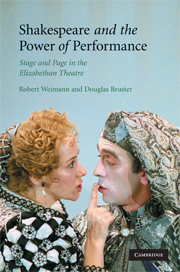Book contents
- Frontmatter
- Contents
- Acknowledgments
- Introduction
- Chapter 1 “Moralize two meanings” in one play: contrariety on the Tudor stage
- Chapter 2 Performance, game, and representation in Richard III
- Chapter 3 Mingling vice and “worthiness” in King John
- Chapter 4 Clowning: agencies between voice and pen
- Chapter 5 Clowning at the frontiers of representation
- Chapter 6 Cross-dressing and performance in disguise
- Chapter 7 Personation and playing: “secretly open” role-playing
- Chapter 8 Character/actor: the deep matrix
- Chapter 9 Character: depth, dialogue, page
- Chapter 10 King Lear: representations on stage and page
- Notes
- Index
- References
Chapter 7 - Personation and playing: “secretly open” role-playing
Published online by Cambridge University Press: 22 September 2009
- Frontmatter
- Contents
- Acknowledgments
- Introduction
- Chapter 1 “Moralize two meanings” in one play: contrariety on the Tudor stage
- Chapter 2 Performance, game, and representation in Richard III
- Chapter 3 Mingling vice and “worthiness” in King John
- Chapter 4 Clowning: agencies between voice and pen
- Chapter 5 Clowning at the frontiers of representation
- Chapter 6 Cross-dressing and performance in disguise
- Chapter 7 Personation and playing: “secretly open” role-playing
- Chapter 8 Character/actor: the deep matrix
- Chapter 9 Character: depth, dialogue, page
- Chapter 10 King Lear: representations on stage and page
- Notes
- Index
- References
Summary
To reopen the question of character here is to contextualize, between page and stage, the various forms and functionings of Shakespeare's dramatis personae. Once we have begun, in Paul Yachnin's words, “to understand that Shakespearean characterization is an artful response to the situation of the theatre,” we can better come to grips historically with the complexities of this response. To do so we must examine how a distinctly literary product unfolded within a culturally innovative and socially divergent institution. Here it seems difficult to do justice to a rich variety of interactions between two major communicative modes of articulation without taking account of a highly varied set of effects. In view of an extremely wide and changeful range of performance practices, we propose to look at the two media in a radically contingent relationship.
In this relationship the respective weight and potency of the one inflects the workings of the other. Put simply, the making of Shakespeare's dramatis personae can be traced on a wide spectrum bracketed by two extreme ways of figuration. One is where writing, in shaping dramatic speech and action of imaginary agents, provides given, more or less authoritative contours for staging images of artificial persons. The other sees the strength of the performative, the material act of staged counterfeiting, as pervasive enough to assert itself in its own right and to affect by its own authority the imaginary figuration of a person even before it comes to be staged.
- Type
- Chapter
- Information
- Shakespeare and the Power of PerformanceStage and Page in the Elizabethan Theatre, pp. 139 - 159Publisher: Cambridge University PressPrint publication year: 2008



